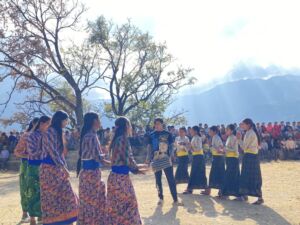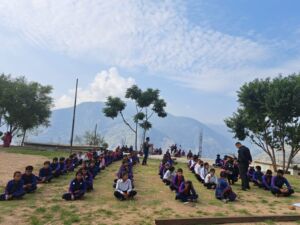Annual International Service Project/Fundraising
Retaining Girls in School, Nepal – CFUW’s ISP Project for 2024-2025
Why is this project important to CFUW?
CFUW has a long tradition of advocating for the education, equality, and wellbeing of women and girls worldwide. Through annual fundraising CFUW contributes to a project that directly benefits women and young girls and provides the possibility to change lives and futures and this project fits our mandate perfectly.
CFUW has partnered with 60 Million Girls Foundation on our International Service Project (ISP) for 2024-2025. Our goal is to raise $15,000 from Clubs and individuals by April 30 for two mobile devices for use in schools in remote areas of Nepal. These devices will help keep girls in school and educate students about their sexual and reproductive health.
Why is this project important to CFUW?
CFUW has a long tradition of advocating for the education, equality, and wellbeing of women and girls worldwide. This project fits our mandate perfectly. Read more from 60 Million Girls about the project.
The Project in Nepal:
All information on Retaining Girls in School- Nepal is from:
https://60millionsdefilles.org/en/our-projects/2024-nepal/
Background:
 The retention and participation of girls in school in rural Nepal is linked closely with a lack of awareness and stigma around sexual and reproductive health (SRH) issues and harmful practices such as child marriage and chhaupadi (segregation during menstruation) which lead to missed school and school drop-out.
The retention and participation of girls in school in rural Nepal is linked closely with a lack of awareness and stigma around sexual and reproductive health (SRH) issues and harmful practices such as child marriage and chhaupadi (segregation during menstruation) which lead to missed school and school drop-out.
Chhaupadi is an ancient tradition practiced in some rural parts of Nepal. It involves banishing people, often young girls, to mud huts or sheds for the duration of their period, or even longer. It is believed they will otherwise bring their family bad luck, or ill health.
Women and young girls who menstruate are often left with little or no supplies, and no menstrual protection or washing facilities during their time away from home. This can cause a range of health issues, along with physical and psychological hardship. They might also be placed in considerable danger.
Although chhaupadi has been illegal in Nepal since 2005, it is still practiced in many communities.
To support girls’ education the project aims to improve girls’ participation and retention in school by strengthening and making more accessible comprehensive sexuality education (CSE) and life skills education in secondary schools in rural and remote Nepal. CSE is proven to help adolescents avoid negative health consequences from unintended pregnancies and STIs, promote gender equality, and improve critical thinking, communication, and decision-making skills.
Project Objectives:
The project will directly reach up to 1,000 students (at least 50% girls) from grade 6 and up in the Khandachakra Municipality, Kalikot District of Nepal, as well as 25 teachers, and 60 SMC members.
Mobile Learning Labs (MLL) will deliver CSE in five schools. While CSE has been integrated into the curriculum for over a decade, teachers are often inadequately prepared to cover such topics or feel uncomfortable with the content.
The MLLs are a novel way to deliver CSE in Nepal, which to our knowledge has not been tested before in this context.
The project will support girls’ education in Nepal by (1) strengthening CSE to raise awareness of the importance of Sexual and reproductive Health (SRH), learn about navigating healthy and respectful relationships, and reduce the stigma around menstruation; and (2) equipping girls with the tools and life skills to advocate for their health and wellbeing, improve agency, and make informed choices. This increase in awareness and skills is expected to help avoid early marriage, reduce the stigma of menstruation, and improve the ability of girls to advocate for themselves, all of which will support girls’ education by increasing participation and retention in school.
The MLLs offer an alternative method of delivering CSE and learning about life skills which will help to overcome taboos when discussing SRH. A consultation with the schoolteachers will be conducted to ensure that the CSE content is relevant and context appropriate.
 The project will hire an IT and CSE specialist to design and upload the CSE & life skills content to the MLL. Servers and devices will be distributed to the five project schools and selected teachers will be trained as “facilitators” to oversee the implementation of the CSE MLL sessions. Local staff will arrange regular supportive supervision with teachers and periodic meetings with the School Management Committees (SMC) to ensure the smooth running of the project and to address any issues that arise and make course corrections.
The project will hire an IT and CSE specialist to design and upload the CSE & life skills content to the MLL. Servers and devices will be distributed to the five project schools and selected teachers will be trained as “facilitators” to oversee the implementation of the CSE MLL sessions. Local staff will arrange regular supportive supervision with teachers and periodic meetings with the School Management Committees (SMC) to ensure the smooth running of the project and to address any issues that arise and make course corrections.
The project will engage the municipal education department which is responsible for educational plans and policies in the municipality. The project will also work closely with SMCs which are responsible for the operations and management of schools. The project will organize an orientation meeting with the committee members to gain their support and buy-in to the intervention, advocate for the importance of CSE, and ensure ownership by the SMC. The MLLs will be handed over to the SMCs at the project end and they will ensure the continued delivery of CSE and maintenance of MLLs. They will also ensure assets donated to the school are kept safe, accounted for and used as intended.
The project will emphasize building the capacity of teachers and schools to utilize and maintain the MLLs. A consultation with schools, municipalities and SMCs at the beginning of the project, will ensure that the MLL content is context appropriate and beneficial to the students. The project will also support the municipality’s plan to eliminate child marriage. The SMCs will be involved in the project from the start to establish responsibility for the MLLs and ensure the MLLs are maintained and accessible beyond the timeline of the project
Why partner with HealthBridge Foundation of Canada
This will be 60 million girls first project with partner HealthBridge Foundation of Canada. The fact that HealthBridge’s midterm assessment of their current long term project in Nepal highlighted the need for innovative approaches to deliver CSE, it was felt that the MLL would be a particularly good fit. 60 million girls’ past evaluation of the impact of the MLLs included feedback from adolescent girls who specifically appreciated the fact that with the MLL, sexual health and reproduction information and other often taboo subjects could be learned about in private.
HealthBridge’s Sexual, Reproductive, Maternal and Child Health & Rights Program works with local partners in low and middle-income countries to support and strengthen programs and policies that protect SRMCH and rights and promote gender equality in communities and among people living in vulnerable situations. Their work also focuses on increasing the availability, acceptability, and quality of essential SRMCH services among marginalized, rural, remote and hard-to-reach groups. Their approach to improving SRMCH and rights includes community engagement and male engagement. 60 million girls knows the powerful impact that CSE can provide to ensure girls’ long term participation in school. This specific project in Nepal will be addressing an extremely vulnerable population.
All information on Retaining Girls in School- Nepal is from:
https://60millionsdefilles.org/en/our-projects/2024-nepal/
How can I support this project? Donate to 60 Million Girls!
Donations to 60 Million Girls will be sent DIRECTLY to their organization and not to CFUW.
To ensure that donations are properly recorded, we ask that you follow these instructions when submitting your donations:
Donate by Cheque:
Make cheque payable to: 60 Million Girls
Send to Address: 5745 Place Turcot, Montreal, QC, H4C 1W1
In the note section of the cheque, please state your club’s name, so amounts being received can be recorded as donations from CFUW-FCFDU.
Donate Online (Credit Card):
If donating by credit card, you can go to 60 Million Girls’ website and click ‘Donate Now’.
Donating by credit card enables you to receive a donation receipt through email as soon as payment has gone through.
Donate Aeroplan Miles:
60 Million Girls is a participating charity in Aeroplan’s Charitable Pooling Program. You can donate Aeroplan miles to the Foundation, which they will be able to redeem to help pay for travel, car rental, and hotel expenses of speakers whom they invite to their annual conference. There are 4 simple steps to follow to donate your miles:
Go to aircanada.com
Click on DONATE NOW.
Enter your Aeroplan account number and your password.
Donate your miles